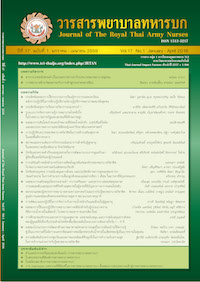ปัจจัยส่วนบุคคล การสนับสนุนทางสังคม และประสิทธิภาพการดูดนม ของทารกก่อนจำหน่าย ในการทำนายการเลี้ยงลูกด้วยนมแม่อย่างเดียว 1 เดือน ในมารดาที่มีบุตรคนแรก
Keywords:
ความตั้งใจในการเลี้ยงลูกด้วยนมแม่, การสนับสนุนทางสังคม, ประสิทธิภาพการดูดนมของทารก, การเลี้ยงลูกด้วยนมแม่อย่างเดียว, Breastfeeding Intention, Social Support, Effective Suckling, Exclusive BreastfeedingAbstract
การวิจัยครั้งนี้มีวัตถุประสงค์เพื่อศึกษาอำนาจในการทำนายของปัจจัยส่วนบุคคล (อายุ ความตั้งใจในการเลี้ยงลูกด้วย นมแม่ การทำงาน) การสนับสนุนทางสังคม (การสนับสนุนจากครอบครัว การสนับสนุนจากเจ้าหน้าที่) และประสิทธิภาพการดูดนม ของทารกก่อนจำหน่าย ต่อการเลี้ยงลูกด้วยนมแม่อย่างเดียว 1 เดือน ในมารดาที่มีบุตรคนแรก กลุ่มตัวอย่างเป็นมารดาหลังคลอด และทารกแรกเกิด ที่หอผู้ป่วยหลังคลอด โรงพยาบาลจุฬาลงกรณ์ สภากาชาดไทย จำนวน 115 คู่ เก็บรวบรวมข้อมูลโดยใช้แบบ สัมภาษณ์ข้อมูลส่วนบุคคล แบบสอบถามความตั้งใจในการเลี้ยงลูกด้วยนมแม่ แบบสอบถามการสนับสนุนการเลี้ยงลูกด้วยนมแม่ จากครอบครัว แบบสอบถามการสนับสนุนการเลี้ยงลูกด้วยนมแม่จากเจ้าหน้าที่ แบบประเมินประสิทธิภาพการดูดนมของทารก ก่อนจำหน่าย และแบบสัมภาษณ์การให้อาหารทารก วิเคราะห์ข้อมูลโดยการคำนวณค่าร้อยละ ค่าเฉลี่ย ส่วนเบี่ยงเบนมาตรฐาน และสถิติถดถอยโลจิสติกส์
ผลการวิจัยพบว่า ปัจจัยทั้ง 6 ปัจจัย ได้แก่ อายุ ความตั้งใจในการเลี้ยงลูกด้วยนมแม่ การทำงาน การสนับสนุนจากครอบครัว การสนับสนุนจากเจ้าหน้าที่ และประสิทธิภาพการดูดนมของทารกก่อนจำหน่าย สามารถร่วมกันทำนายโอกาสในการเลี้ยงลูก ด้วยนมแม่อย่างเดียว 1 เดือน ได้ถึงร้อยละ 49.9 (R2 = .499, p < .01) แต่มีเพียงปัจจัยเดียวที่สามารถทำนายการเลี้ยงลูกด้วย นมแม่อย่างเดียวได้อย่างมีนัยสำคัญทางสถิติ คือ ประสิทธิภาพการดูดนมของทารกก่อนจำหน่าย (p < .01)
ผลการวิจัยครั้งนี้มีข้อเสนอแนะว่า พยาบาลควรส่งเสริม และสนับสนุนการเลี้ยงลูกด้วยนมแม่ โดยการช่วยเหลือ ในการฝึกทักษะการให้ทารกดูดนมแม่ได้อย่างมีประสิทธิภาพก่อนจำหน่าย
Personal Factors, Social Support and Effective Suckling at Discharge in Predicting Exclusive Breastfeeding at one Month Among First-Time Mothers
This descriptive research was aimed to investigate the predictive influences factors to predict exclusive breastfeeding at one month in first - time mothers which comprise of personal factors (age, breastfeeding intention, employment), social support (family support, staff support) and effective suckling before discharge from the hospital. Subjects consisted of 115 pairs of postpartum mothers and their newborns at the postpartum wards, King Chulalongkorn Memorial Hospital of the Thai Red Cross Society. Data were collected by using 6 questionnaires including : personal data questionnaire, family support of breastfeeding questionnaire, staff support of breastfeeding questionnaire, breastfeeding intention questionnaire, effective newborn suckling assessment form at discharge, and interview form about infant feeding. Data were analyzed in terms of percentage, mean, standard deviation, and logistic regression.
The findings revealed that all six factors including age, breastfeeding intention, employment, family support, staff support, and effective suckling at discharge could predict 49.90% (R2 = .499, p < .01) of the variance in exclusive breastfeeding at one month in first-time mothers, and only effective suckling at discharge was a statistically significant predictor. p < .01)
Based on the study findings, it is recommended that nurses should promote and support breastfeeding by supporting them to practice breastfeeding skill until their newborns can suck effectively before discharge from the hospital.
Downloads
Downloads
How to Cite
Issue
Section
License
บทความหรือข้อคิดเห็นใดใดที่ปรากฏในวารสารพยาบาลทหารบกเป็นวรรณกรรมของผู้เขียน ซึ่งบรรณาธิการหรือสมาคมพยาบาลทหารบก ไม่จำเป็นต้องเห็นด้วย
บทความที่ได้รับการตีพิมพ์เป็นลิขสิทธิ์ของวารสารพยาบาลทหารบก
The ideas and opinions expressed in the Journal of The Royal Thai Army Nurses are those of the authors and not necessarily those
of the editor or Royal Thai Army Nurses Association.






